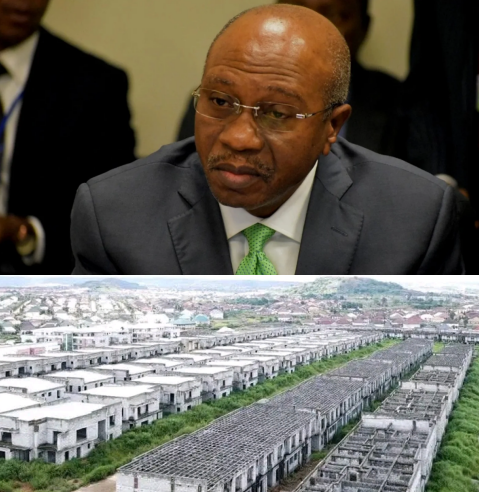An FCT High Court in Apo, Abuja, on Monday dismissed a motion by former Central Bank of Nigeria (CBN) Governor Godwin Emefiele to regain a forfeited Abuja estate consisting of 753 duplexes and apartments.
The estate, located on Plot 109, Cadastral Zone CO9, Lokogoma District, is 150,000 square meters.
The Economic and Financial Crimes Commission (EFCC) had already secured interim and final forfeiture orders of the property in favor of the Nigerian government.
Although the property was recovered from a high-ranking government official who was not disclosed, Emefiele, through his lawyer A.M. Kotoye (SAN), sought to be joined, claiming that he had an interest in the estate.
- Boko Haram IED Explosion on Borno Road Kills Eight, Wounds Others
- EFCC Opens Probe of 24 Nigerian Young Men Detained in Ghana over Suspected Cybercrimes
- Former CBN Governor Emefiele Attempts To Regain Forfeited Abuja Estate; Court Dismisses the Attempt
- King Sunny Ade’s House Divided as Daughter Alleges he has Been Kidnapped; Other Family Members Deny Claim
- You Can Gather All Governors But If Nigerians Reject You, it is Over — El-Rufai Tells Tinubu
- Woman Leaves Husband after Falling in Love with ChatGPT
Emefiele alleged he was unaware of the forfeiture proceedings, blaming the EFCC for intentionally publishing the interim forfeiture notice in a concealed section of Punch newspaper.
He said he was preoccupied with defending himself in three criminal cases in Abuja and Lagos, which made it impossible for him to file a response on time.

He blamed the EFCC for concealing the forfeiture actions during their frequent interactions. Justice Jude Onwuegbuzie, in his ruling, said that the publication was sufficient, as a half-page advertisement in a national newspaper could not be described as inconspicuous.
He maintained that in line with Section 17(2) of the Advance Fee Fraud and Other Fraud Related Offences Act, 2006, proper procedure was observed. The judge ruled Emefiele had over 14 days to appeal the forfeiture but did not.
He dismissed the former CBN governor’s application, ruling that only interested parties in a forfeited property can appeal such orders. The court ruled entirely in the EFCC’s favor, sealing the government’s ownership of the estate.












